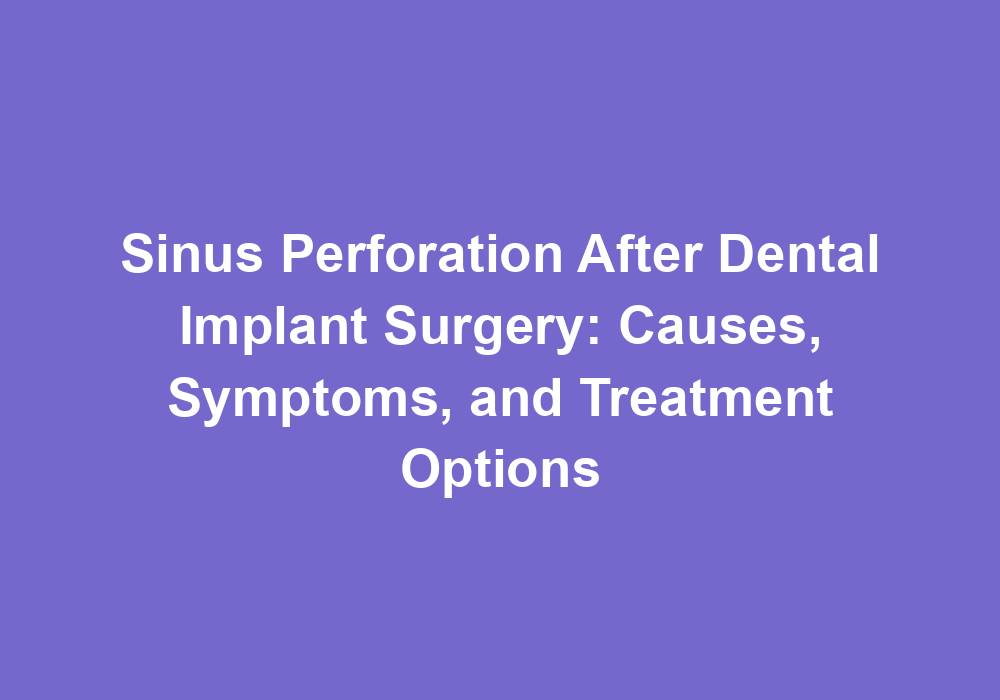Teleconsultation – 2023-07-13 17:28
I have pain after dental implant surgery in the upper jaw, the first molar. I have blood aout of the nose and it seems that when I sneeze there comes air aout of my mouth. What should I do.
Treatment Plan
Based on your described symptoms, it sounds like you may have experienced a sinus perforation during your implant surgery. If this is the case, it can lead to communication between the oral cavity and the maxillary sinus, which could cause the symptoms you described, such as air traveling between the nose and mouth when you sneeze.
In order to determine the best course of action, you should first consult with your oral surgeon or dentist as soon as possible. Below are potential steps in your treatment plan, depending on the severity of the perforation:
- Assessment: The first step will be to diagnose the issue. This will likely involve a clinical examination and possibly a cone beam computed tomography (CBCT) scan to determine the extent of the perforation.
- Medication: If sinusitis (an infection of the sinus) is present, antibiotic therapy will be started to control the infection. In addition, you may need to take decongestants to reduce sinus pressure and promote healing.
- Surgery: Depending on the size of the perforation, surgery may be required to close the communication. This might include a sinus lift procedure or a lateral window technique using grafting material to seal off the perforation.
- Rest: Post-surgery, you should refrain from blowing your nose and avoid activities that could increase sinus pressure, such as flying or diving.
- Follow-up: Regular follow-ups will be necessary to monitor the healing process and to ensure no further complications arise.
It’s important to act quickly in these situations to minimize complications and promote healing. Please contact your dental professional as soon as possible to discuss these symptoms and arrange an assessment.
Alternative Treatment Options
In some cases, if the dental implant is causing ongoing issues and the perforation is not healing correctly, the implant may need to be removed. After the sinus has healed completely, a new implant can be placed, possibly with the use of a sinus lift procedure to ensure adequate bone support for the implant.
Another option could be to consider a different type of tooth replacement, such as a dental bridge or removable partial denture, which would not involve the sinus area.
Estimated Costs
In the case of a sinus perforation, additional costs would likely arise due to the need for further treatment. These costs can vary widely depending on the exact procedures needed. Here is an estimation following the AUTONOME HONORARRICHTLINIEN guidelines:
| Bezeichnung | Anzahl | Honorar |
| Medication (antibiotics, decongestants) | 1 course | 30-100 € |
| CBCT Scan | 1 | 120-250 € |
| Sinus lift procedure | 1 | 1,000-2,500 € |
| Dental Implant Removal (if necessary) | 1 | 200-500 € |
| Follow-up appointments | Multiple | 50-100 € each |
Please note these costs are estimates and the exact cost can vary depending on individual cases and the specific treatments required.
In sum, it’s crucial that you contact your dental professional immediately to discuss the symptoms you’re experiencing and to determine the necessary course of action.
General Data Protection Regulation (GDPR)
Kindly take note that this is a research project conducted by Michael Truppe, MD and should not be considered as medical advice. All rights reserved © 2023 Michael Truppe, MD.
EURODOC Telemedizin ForschungsgesellschaftmbH
Albertgasse 3/6, 1080 Wien
Tel: +43 1 408 95 00 66
Email: cloud@smile.wien
Web: https://smile.wien


Leave a Reply